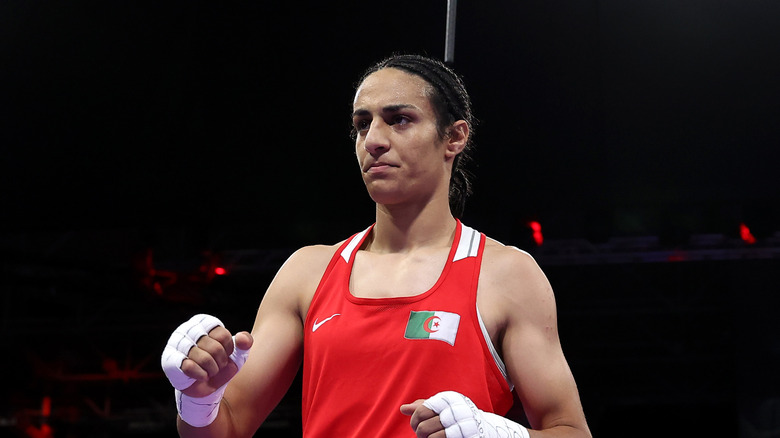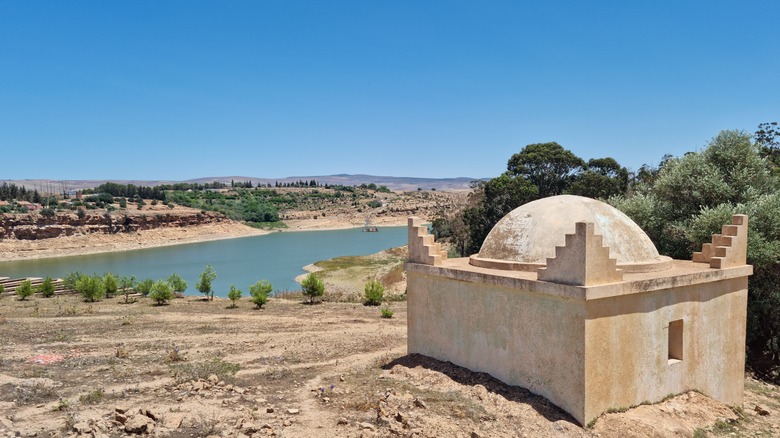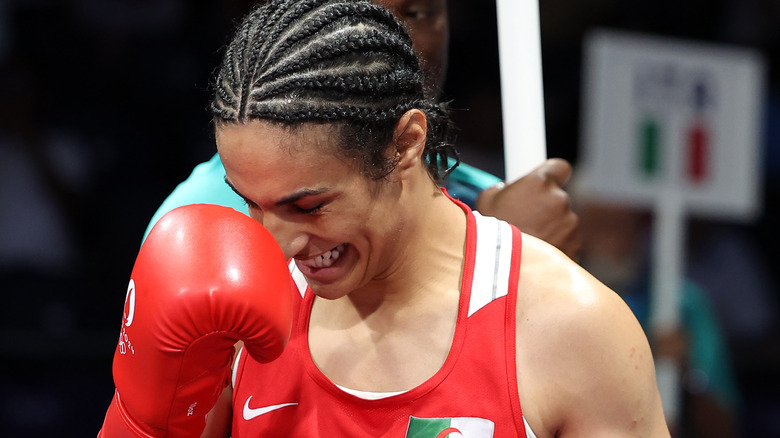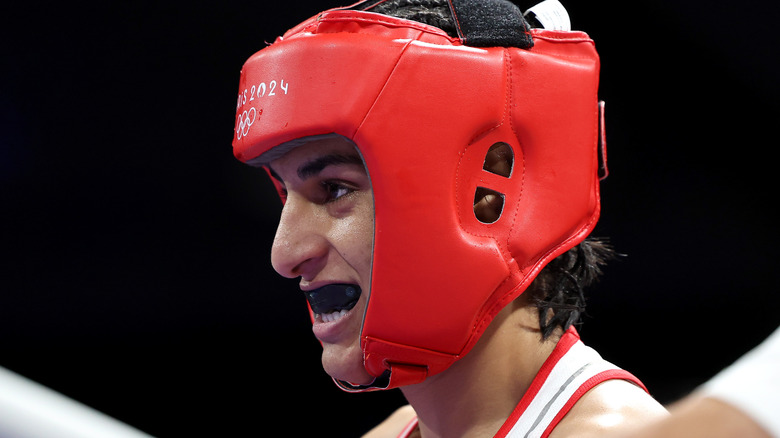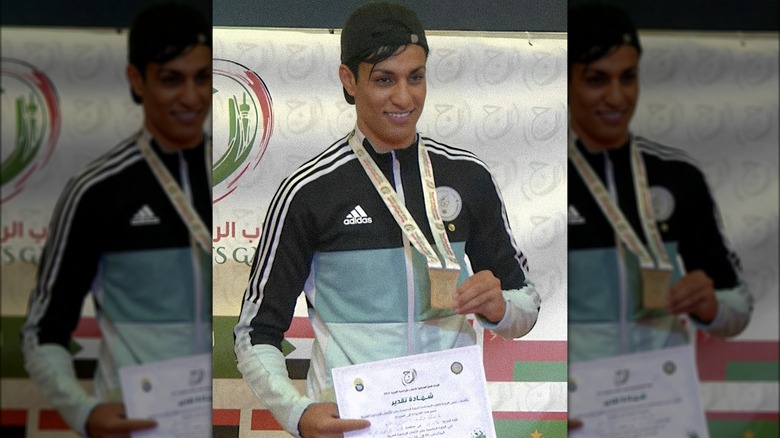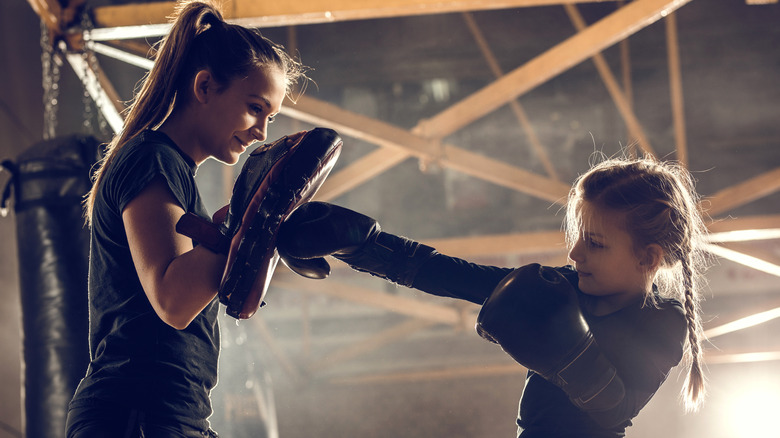The Hidden Truth Of Olympic Boxer Imane Khelif
Boxing is an ancient sport, and while the origins of pugilism likely date back to the murkiest mists of human prehistory, it has been one of the many games contested in the Olympics since antiquity. Even in the modern Olympics, boxing made its early appearance from 1904 onwards, but women's boxing is a far more recent addition, having only become an official Olympic category since the 2012 London Summer Games. A few years later, in a rural part of Algeria, a teenage girl with a talent for soccer watched the women's boxing during the 2016 Rio de Janeiro Olympics. From that moment on, that girl, Imane Khelif, was set on a path to her own Olympic glory — and controversy.
It was not challenging enough that Khelif was brought up in an environment that discouraged women from playing sports, nor that her own father was reluctant to see her become a boxer. Her family was poor, and the nearest gym was a long and expensive bus ride away. But Khelif was born with a fighter's spirit, and her perseverance and athletic ability swept those challenges aside. She has since turned her attention to not only winning medals on the world stage, but also encouraging Algerian children to follow her example for a healthier and happier life. While the thornier parts of her life journey may not yet rank among the tragedies of boxing's biggest legends, the truth behind Olympic boxer Imane Khelif is heartwarming and inspirational.
Imane Khelif had a challenging childhood in rural Algeria
Imane Khelif was born in 1999 in Tiaret, Algeria, a city of fewer than 150,000 at that time and which sits in a wider region of the same name. Far from the wealth of Algeria's capital city, Algiers, and flanked by North Africa's Atlas Mountains, the province of Tiaret relies heavily on agriculture, and Khelif's family were no strangers to poverty. Her father worked in the Saharan desert as a welder, spending long periods away from their remote village, and while the occupation of her mother is unknown, Khelif made it clear in an interview with UNICEF that their finances were sorely stretched when she decided to pursue boxing at the age of 16.
The initial hurdles she faced were not just the cost of equipment or gym memberships or personal trainers; just the bus fare to travel the 10 kilometers to the nearest gym was enough of a hindrance. It also did not help that she could not approach her father for the funds, since he did not approve of her newly chosen sport. But, undeterred, the teenage Khelif founds ways to raise the funds, saying in an interview with Canal Algérie (via Birmingham Live), "I happened to sell bread in the street, I collected dishes and other objects to earn money and to be able to move around because I came from a very poor family."
She discovered a talent for boxing after being bullied for playing soccer
Growing up in rural Algeria, Imane Khelif was surrounded by a deeply conservative culture that has still yet to fully embrace women's rights. But even before she turned to boxing in her mid-teens, the young Khelif was challenging these cultural norms with her prowess at soccer. Athletic by nature, Khelif fell in love with a sport that was largely seen as a boy's game. She also attracted plenty of the wrong sort of attention for being a girl who played soccer, let alone being a gifted player, with jealous local boys mercilessly taunting and even physically attacking her. But as fate would have it, her ability to hold her own in those fights, with her natural speed and agility helping her dodge the punches of her tormentors, cracked open the door to the world of boxing.
Khelif herself retroactively expressed surprise at that change of ambition, saying to Canal Algérie (via Birmingham Live), "It was pure chance, I never imagined one day that I would become a boxer and that I would become world champion. I have always loved football and I played it in my little village." Khelif went on to describe how she was encouraged to take up boxing by a teacher who had seen her potential, and that she was further inspired after watching women's boxing during the 2016 Olympics, held in Rio de Janeiro, Brazil. After one training session, she was hooked and did not look back.
Imane Khelif's parents had mixed feelings about her boxing ambitions
As a child and a teenager, Imane Khelif had already demonstrated a gift for athletics, and she initially channeled that talent into soccer. Despite being targeted by local boys for what was generally seen as a male sport, her father, a welder who worked long hours in the Algerian Sahara, seemed to approve. But when she set her sights on boxing, that support from her father disappeared, as she succinctly told Canal Algérie (via Birmingham Live), saying, "My father always preferred football to boxing." As a result, when faced with raising funds to pay for her bus fares to boxing training sessions, as well as the training itself, she was unable to broach the subject with her father. However, her mother had other ideas, helping Khelif raise funds by selling couscous while her daughter sold scrap metal and bread.
Khelif kept her travels to and from training a secret from her father, relying on his work-related absences from home to avoid attention. Three years later, Khelif was competing in the 2018 World Championships, where she came 17th. And as for her parents? "Both my parents come to support me. They are my biggest fans," she happily told UNICEF in early 2024, as she prepared for that year's Summer Olympics in Paris.
Her image as a boxer was modest on the world stage until the 2024 Paris Olympics
Since finishing 17th in the 2018 AIBA Women's World Boxing Championships after just three years of training, Imane Khelif has proven herself as a world-class boxer. She continued her career as a welterweight/ lightweight with medal finishes in five major tournaments, including three gold medals in three separate regional games in 2022 and 2023, and was a quarter-finalist in Tokyo's 2020 Summer Olympics. And so while Khelif certainly earned a reputation as a fierce fighter, she's not exactly a legendary one, either. But in the 2024 Summer Olympics, after a victorious final-16 fight against Italy's Angela Carmini, Khelif found herself in the limelight, and not for the reasons she may have hoped.
The Olympic women's boxing match between Khelif and Carmini lasted a mere 46 seconds, with Khelif winning the fight after a flurry of punches caused Carmini to dramatically bow out. Reports of Carmini's tearful forfeiture, combined with her reportedly describing Khelif's strikes as far more powerful than anything she'd experienced before — comments which Carmini soon apologized for — rapidly drew unfair criticism of Khelif. It certainly did not help that the International Boxing Association (IBA) — which for various disreputable reasons has been disavowed by the International Olympic Committee (IOC) since 2019 — had disqualified Khelif from their 2023 World Championships for vague, unsubstantiated gender tests.
Truth is, with nine defeats by other female opponents over the course of her career, Khelif's boxing record is impressive but not extraordinary, at least not at the Olympic level she has been competing in.
[Featured image by Algeria Press Service via Wikimedia Commons | Cropped and scaled | CC BY-SA 3.0]
Imane Khelif is a UNICEF ambassador promoting sport for disadvantaged Algerian children
Imane Khelif is greeted by her fellow Algerians with roars of cheers at boxing tournaments, including domiciled French Algerians during Paris' 2024 Olympics, and in that year, Khelif found a way to give back to her country. Algeria, like any other nation, has its fair share of pressing issues, and according to Khelif, one of them is a lack of recognition of the health benefits that sport can bring to children.
In January 2024, the rural village girl who beat the boys at football and became an Olympic boxer took on another role: national ambassador for UNICEF, the child-focused humanitarian branch of the vast and complex U.N., hoping to spread sports awareness and inspiration for both parents and children. Girls in particular are a focus for Khelif in a country that has historically restricted opportunities for women, but she hopes that her message and example will benefit all Algerians, saying in an interview with UNICEF, "Many parents are unaware of the advantages of sport, and how it can improve not only your physical fitness but also your mental wellbeing."
You can also catch up here on the most controversial things from the 2024 Olympics so far, or find out more about the most memorable moments from Summer Olympics history.
